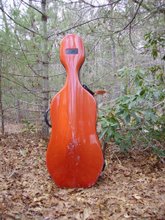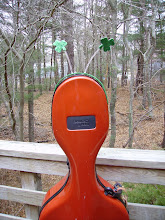In cello choir class the other night, after we both bumbled through a tricky passage, the woman who was playing first with me turned to me and said: “I practiced this part! I played it perfectly at home! I really worked on it.” I stopped her by saying, “I did too, and I marked all the fingering, but now when I look at those numbers they mean nothing to me.”
She, too, had worked out the fingering. Then I admitted I only worked on it in one or two practice session, over the last two weeks—and so did she. We both finally did get it right, but it was a struggle.
This is something one should learn early on in practicing, that, to “set” a passage, you have to slow it down and play it over and over again, even after you get it right. The brain remembers all those times you flubbed it. Another woman had trouble because she kept slowing down when she got to her tricky passage. This is another reason to play the whole piece slowly in practice, rather than to try to play it up to speed immediately. I’m working on this!
The cello choir is one of several adult cello choirs at the local conservatory. The more advanced choir has eight players; ours, an intermediate level group, has five. There are one or two less advanced groups with 3 to 5 players. There is also a string orchestra (which I joined for a time) and a community orchestra, both of which have numerous cellists.
It is amazing to me that in this small area there are so many adult cellists, all of whom absolutely love the cello. I think it is largely due to the cello choir teacher, the teacher of most of the other cello choir students, who welcomes adult students with endless patience and gentle support. My own teacher has group classes only rarely, and far fewer adult students, so the cello choir classes are a great way for me to play with other cellists.
This week, however, we were teacherless, as our teacher had another commitment. We did just fine on our own—there is much we students can learn from each other and from being left on our own to figure things out for ourselves every now and then.












2 comments:
Hi Maricello!
Nice blog! :)
I used that line so many times at my lessons that even I was getting tired of hearing it. What made me stop was a comment by Zambo on CelloChat - whenever one of his students said that, he replied that he taught it perfectly at home, too.
I've been pondering the issue of why it is so hard for me (and apparently lots of other adult students) to work on difficult passages slowly. I KNOW it is the only way to learn it but I still rush into playing at full tempo long before I should - assuming I guess, that I'll conquer those tricky passages by bulling my way through them often enough.
G
Hi Guanaco,
Thanks! I enjoy your blog.
I think we get impatient with playing slowly, worried that it will take forever to get up to speed, especially when practice time is limited. I did most of my practicing on that tricky passage (and 3 other pieces) in the last 20 minutes before I had to leave for class, so it seemed there was no time to slow down. But I am really going to try, in the future.
Post a Comment